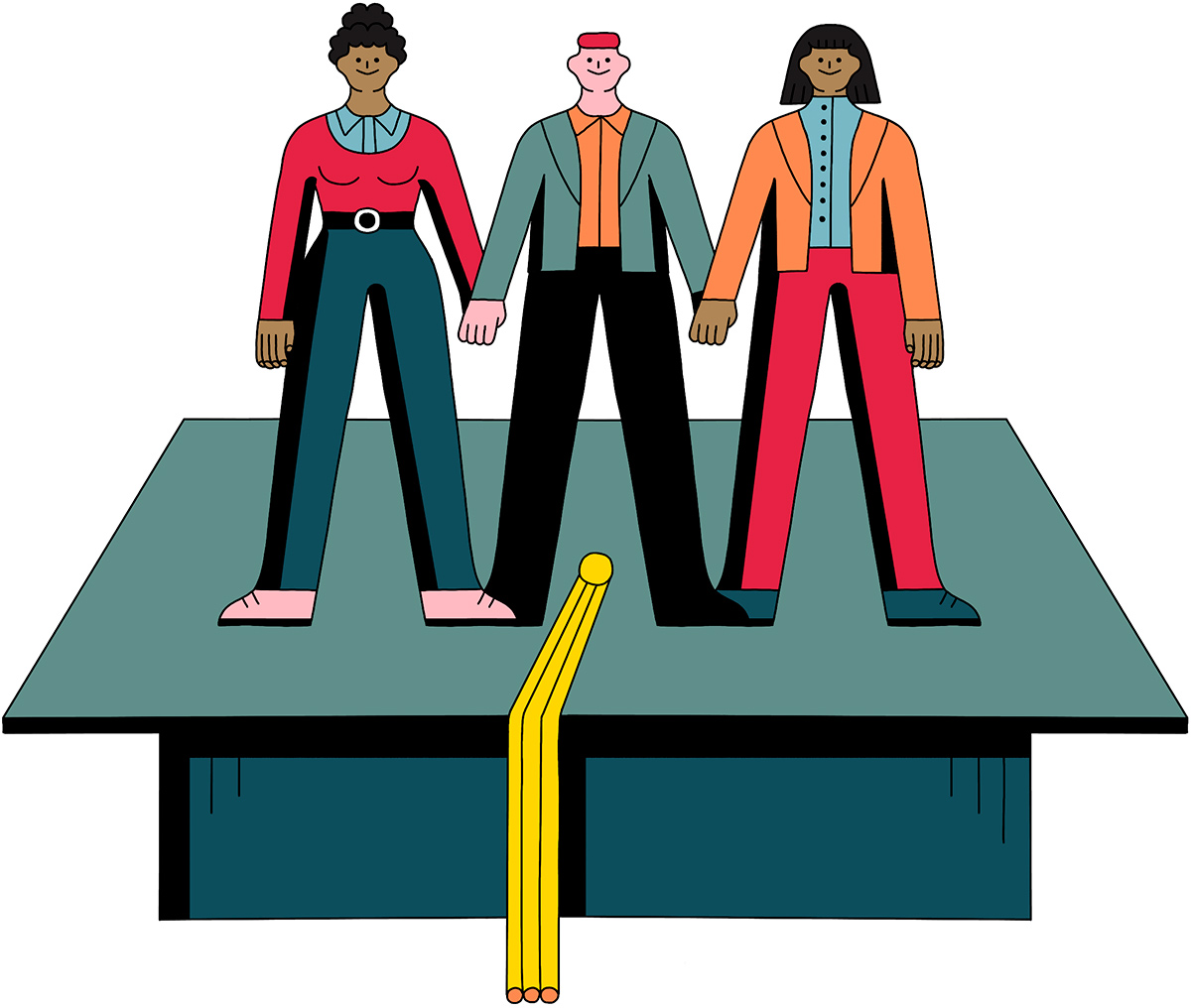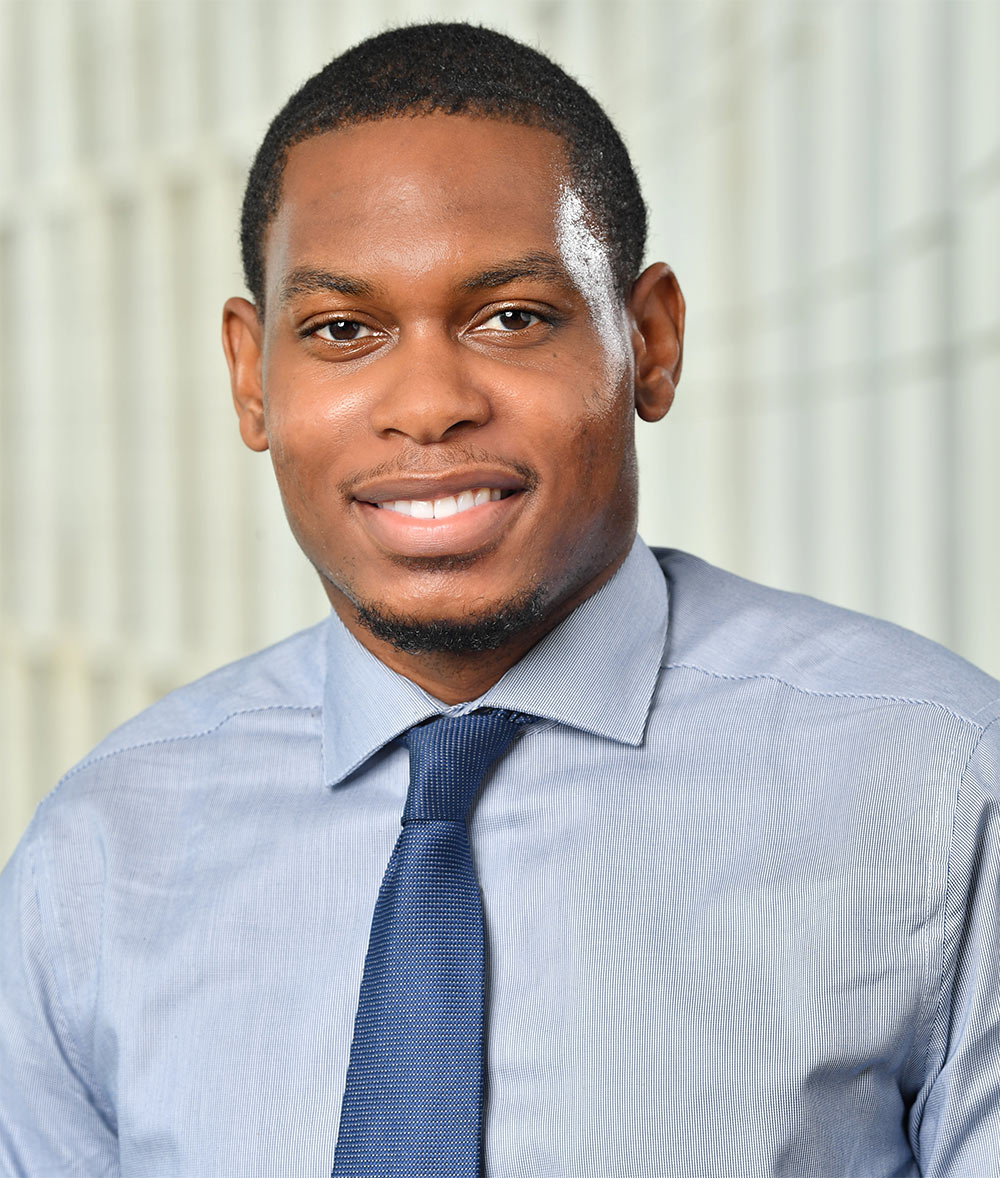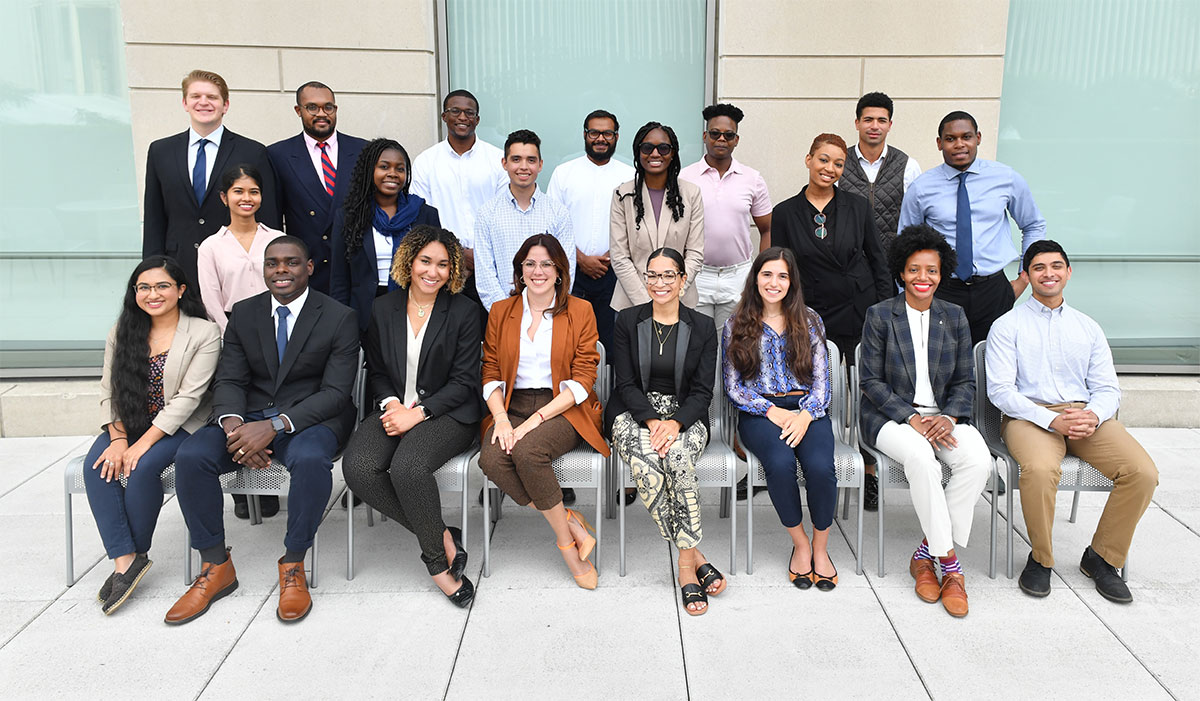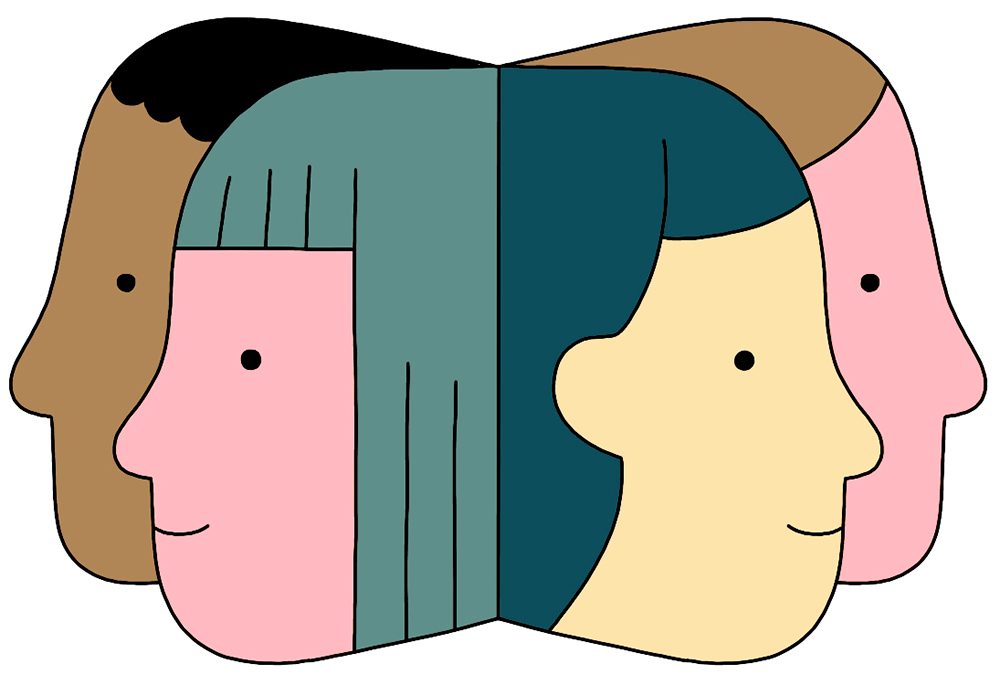No Longer the Onlys

Two major initiatives, the REAL Scholars program and IDEAL, are meant to attract underrepresented students to the Law School and into the legal profession. With them, and other new programs, Fordham Law hopes to help shape a legal landscape that is more just and looks more like America.
“As I got older, there were fewer and fewer Black students in my classes,” Morrissey says. By the time he got to college, he was alone. “I’ve been [the only Black man in class] for years now, but it still hurts to see it and there’s still a level of frustration.”
Fordham Law has been working to ease that pain with several new programs meant to attract and welcome more underrepresented students. Yet too many law students of color across the country continue to find themselves the “onlys” in their sections—or one of just a few among a sea of white faces. “The American Bar Association did a [demographic] review of the legal profession and the numbers were quite abysmal,” says Kimathi Gordon-Somers, assistant dean of student affairs and diversity at Fordham Law.
The disparities are stark: Just 4.7 percent of lawyers in the United States identified as Black, 4.8 percent as Latino, 2.5 percent as Asian, and 37 percent as female, according to a 2021 American Bar Association (ABA) survey. Meanwhile, more than 85 percent of the legal profession identified as white, compared with 60 percent of the U.S. population in the latest census.
Fordham Law seeks to change that. With its newest diversity and anti-racism programs, the Law School is creating a model that can help shape both legal education and the profession to make them more equitable.
A Less Isolating Experience
A 2018 report from the ABA found that students of color were disproportionately less likely to finish law school, with Black students more than twice as likely as white students to leave J.D. programs in their first year and Native Americans nearly three times as likely. Asian, Latino, and biracial students were also less likely to finish.
While the reasons behind these statistics are complex, Dean Gordon-Somers explains that students of color are often first-generation students, and as a result, face additional obstacles at law school including discrimination, isolation, fewer resources and supports, and a lack of exposure to the legal profession that makes the adjustment process more difficult.
Morrissey, who was raised by a single immigrant mother in East Elmhurst, Queens, always had an interest in the law, but held back from applying for several years. “I was very intimidated by the process,” he admits. “I registered for the LSAT exam at least 10 times before taking it. I let my anxiety and my fear get to me.”
While Morrissey contemplated law school, he began a career in human resources to support himself and eventually took a job with New York City’s Health and Hospitals Corporation, recruiting nurses, social workers, and other vital personnel. But after witnessing COVID-19 ravage New York City, his goal of becoming a lawyer took on a newfound urgency.
“Seeing so many people pass away and leave their families behind and their dreams unaccomplished propelled me forward,” Morrissey says. “I knew [law school] was something I had to do or I’d regret it for the rest of my life.”
He began researching how to apply to law school in earnest, but as the first in his family to be born in the United States (his family is from Antigua), “there wasn’t anyone to guide me. I had to figure out the whole thing myself.”

Except now, there is an explicit structure in place to support Morrissey and 19 other 1L students of color, as well as first-generation law students and those from marginalized communities. Together, they make up the inaugural cohort in Fordham’s new REAL Scholars program (REAL stands for Realizing Excellence and Access in the Law). It’s a major new initiative aimed at expanding support for these lawyers-to-be by focusing on four pillars: academic, mentoring, wellness, and networking.
With the REAL Scholars program and others, Fordham Law hopes to make the campus and law school experience feel more welcoming for underrepresented individuals, while also ensuring these students can thrive in their classes and beyond.
For Morrissey, the impact was immediately apparent. “I was surprised to see so much representation in the REAL Scholars program. I did not think there would be so many other Black men there, but there were quite a few of us, and we talk all the time,” says Morrissey, who hopes to go into corporate law.
A Tradition of Diversity, Revisited
“The raison d’etre for founding Fordham Law School was to provide access to the legal profession for groups that had been excluded,” says Dean Diller. “That’s still a core animating value here.”
As part of the sweeping movement for racial justice that was catalyzed last summer, students and faculty at Fordham Law urged Dean Diller and the administration to do more to address structural racism, create a more inclusive environment at the law school, and increase diversity.

These efforts have not gone unnoticed. “I can see that changes are being made,” says Morrissey, who is all for the expansion of blind grading, which reduces implicit and explicit bias in the grading process. Morrissey experienced that bias as an undergraduate, when a professor told him, “I’m grading you harder because you’re Black and the world is going to be harder on you, so you need to get used to it.”
Doing More, Earlier
This is not an exhaustive list. There’s also the IDEAL program (Increasing Diversity in Education and the Law), designed to help bring more students of color to law school. Funding for both IDEAL and the REAL Scholars program was raised through the generosity of alumni and parents. “Like many of our pipeline programs, Ideal reaches beyond the Lincoln Center campus to nurture underrepresented students,” says Dean Diller, “in this case college students who are curious about the law, but who might otherwise not end up in law school.”
To increase diversity, you can’t just focus on current applicants, explains Dean Gordon-Somers. “We need to go further back into college and even high school to let marginalized or underrepresented young people know about opportunities that are available for them.”
IDEAL was initially launched in 2019 but was interrupted by the pandemic. Meant to work in tandem with REAL, it’s open to underrepresented students from the City University of New York system and schools in the greater New York City area. Each year, 10 high school sophomores are accepted, and over the next two years are introduced to different aspects of the law and what it means to be a lawyer, as well as guided through the law school application process.
Alexia Klein ’24, the first in her Orthodox Jewish family to attend university, was accepted into IDEAL’s first class of 10 students as a sophomore at Queens College. She had dreamed of going to law school from the time she was 11, after witnessing the power of the law to change lives when she helped file a restraining order against an abusive family member.
Yet hurdles remained. Klein’s mother worked as a day care assistant to support her and her two sisters, and money was scarce. Klein was also attending a yeshiva, a traditional religious school, and so, she says, college—let alone law school—was not really an option. “Women were really discouraged from going to college, so I had to do it on my own,” Klein says. “You were expected to become a mom to the exclusion of everything else.”
After hearing about the IDEAL program from a college career adviser, she applied, was accepted, and her dreams of attending law school began to crystallize.
Through IDEAL, she attended a prelaw seminar at Fordham where she was introduced to core subjects in U.S. law. She was also mentored by Fordham Law alumni, and placed in summer legal internships at the Children’s Defense Fund and then the law firm Kirkland & Ellis, a key supporter of the IDEAL program along with the Jones Day Foundation.

“
IDEAL demystified the process. It broke down this dream I had into small steps for how to accomplish it.
Alexia Klein ’24
When it came time to apply, “IDEAL demystified the process,” she says. “It broke down this dream I had into small steps for how to accomplish it.” She was able to enroll in an LSAT prep course, got advice on writing her personal statements, and the program paid her application fee to Fordham Law. In addition, she had multiple points of contact available to her at Fordham—including Dean Diller himself.
“Looking back, IDEAL essentially made [law school] possible for me,” says Klein, who hopes to focus on family and criminal law and become a children’s advocate. “I come from a long line of Orthodox Jewish women who didn’t have the opportunity to go to law school,” she says, so going to Fordham Law “was a very big deal for me, my mom, and my grandmother.” As a first-generation college student, she says, “I simply wouldn’t have had that opportunity without IDEAL.”
Though IDEAL is still in its early stages, the initial results are promising. Of Klein’s cohort of 10 students, two are now first-year students at Fordham Law, a few have taken a gap year, and the rest are currently applying to law school or planning to apply next year.
From Law Students to Leaders
That kind of mentoring is ongoing. All participants in the REAL Scholars program are paired with a faculty adviser and an adviser from the Office of Student Affairs; they also work in small groups with teaching assistants and meet regularly with an upper-level student mentor and an alumni mentor.
“Often, there are unspoken rules of the game. Part of our purpose was to level the playing field by providing the rules,” says Kamille Dean, who was hired last year to fill the new position of director of diversity, equity, and inclusion and was closely involved with the creation of the REAL Scholars program.
To help overcome the additional challenges that first-generation students, people of color, and other students from marginalized groups face at law school, REAL works to provide a full set of academic, administrative, and social supports to help them excel at Fordham, according to Dean.

Equally important are the bonds participants form with one another, since many first-generation students, particularly people of color, do not have friends and family who understand their struggles at law school, adding to their sense of isolation.
Klein was one of those students. “It has been very difficult to transition to law school, and I don’t always feel like I belong,” she acknowledges. “But at least I have a support system, and that has been such a major help mental health–wise.”
For Morrissey, too, having like-minded people to talk to has made a big difference. “We have a group chat where we’re constantly sharing information,” he says. “I instantly had this social group I could rely on.”
The built-in support systems and mentoring, he says, have also been crucial. “It’s helpful to have people we can bring our concerns to,” he says. “We have very frank conversations I would not have expected.”
Giving students this strong foundation is paying off: Since the program’s launch in August 2021, REAL Scholars have been at the forefront of their class, with many in the inaugural cohort taking up leadership positions on campus. At least seven have been elected to student offices, including Morrissey, who is now Student Bar Association representative for his section and a member of the Dispute Resolution Society.
“My hope is to double the REAL program by next year and potentially triple it the year after,” says Gordon-Somers. “Once the word gets out, my wish is for the program to grow so we’ll be able to support every student who wants to come to the program.”
Dean agrees, and envisions a future for these initiatives beyond Fordham Law. “We hope to be a model for other schools to do the same,” she says.
In the meantime, students like Morrissey and Klein are helping to inspire others to follow in their footsteps. “When someone is not known to be in a space, they assume that space is not for them,” Morrissey says. Now, “we can let the next generation know that they have that opportunity and ability to be there too.”